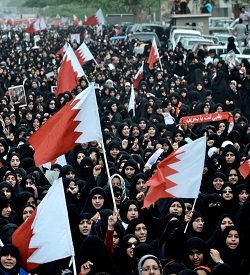In January of this year, the Islamic Educational, Scientific, and Cultural Organization (ISESCO), of which Bahrain is a member, voted to adopt the draft Islamic Declaration on Cultural Rights (IDCR). Unfortunately, the IDCR departs in significant ways from international standards on cultural rights, as primarily enshrined by the International Covenant on Civil and Political Rights (ICCPR) and the International Covenant on Economic, Social, and Cultural Rights (ICESCR), and represents yet another attempt by repressive governments to co-opt international human rights language in an effort to mask their own violations.
A cursory reading of the IDCR demonstrates its non-compliance with commitments that States like Bahrain have made to the international community. For example, article 9 of the IDCR qualifies the right to access of information, stating that everyone shall have the right to “true information from reliable media,” and that everyone may “disseminate accurate and documented information.” This stands in stark contrast to the obligations imposed by ICCPR Article 19, which states that, “Everyone shall have the right to freedom of expression; this right shall include freedom to seek, receive, and impart information and ideas of all kinds…” Going further, article 2 of the IDCR qualifies the right to identify with a particular culture, stating that, “such right shall not however be permitted to cause social strife and jeopardize national identity and equal citizenship.” In this, the IDCR violates the ICESCR, which guarantees this right to all individuals in an unqualified manner.
The IDCR does not say who gets to choose what media is reliable or what jeopardizes national identity, but it presumably trusts governments to make those determinations. In this, the IDCR is not a declaration on cultural rights, but a declaration on cultural limitations. It is an attempt by autocracies to use human rights language to further restrict internationally recognized freedoms. The governments implicated in the IDCR, including Bahrain, must abandon this attempt to establish best practices for human rights abuses and instead should re-commit to achieving full compliance with international cultural rights standards. Bahrain could start by repealing the 22 repressive measures passed last summer limiting the rights to assembly and expression.
The international community must take notice of efforts to co-opt the language of human rights for the purpose of repression and actively defend and protect human rights language from further encroachment.
–
R. James Suzano is Legal Officer at ADHRB
Please click here for a PDF of this blog post.





